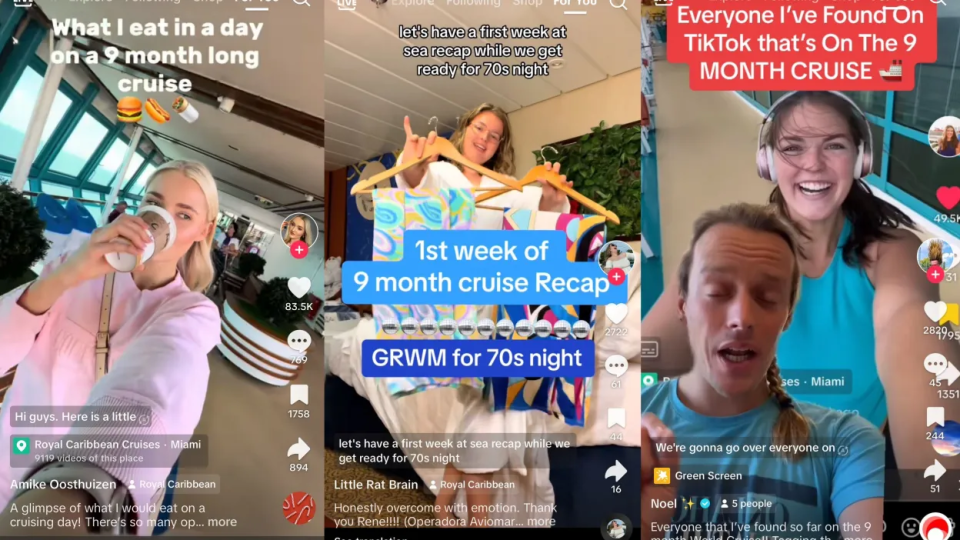
On December 10, the Serenade of the Seas departed the Port of Miami. This cruise is touted as the longest cruise in the world, visiting more than 60 countries in nine months. There is room on board for 859 crew members and 2,476 passengers. Their experiences are closely followed by millions of people on TikTok. The ship is the scene of a potential drama, in which every wave in the water and every change in course heralds a new story. Ordinary people thus become the unintentional protagonists in a spontaneous mix of drama and intrigue.
Gone are the days when viewers were glued to the TV for “The Loveboat”; Today, the global audience is glued to the screens of their smartphones. Shortly after Royal Caribbean’s Serenade of the Seas set sail, many TikTok users became captivated by the journey and the possible events on board. It started with passengers sharing their experiences on TikTok, which was quickly picked up and went viral. The ship turned into a vibrant mix of reality and fiction, similar to shows like HBO’s “The White Lotus” and Bravo’s “Below Deck.” On the mainland, viewers began devouring every piece of cruise-related content, producing their own commentary, and dreaming up wild storylines. The passengers became unconscious actors in this real-time soap opera. Viewers search TikTok for any sign of tension or conflict, real or imagined, in the hope of spectacle. The content, marked with hashtags such as #ultimateworldcruise, #worldcruise and #9monthcruise, has already amassed hundreds of millions of views.
The charm of the cruise lies in the promise that you, as a consumer, get to dwell in a world built almost entirely around your comfort and pleasure. However, in an age where “everything is content,” this dynamic can suddenly reverse, making your very presence the topic of interest to others. This shift fundamentally changes our perception and way of existence. We become, willingly or not, part of an endless stream of content, constantly viewed, contemplated or discussed by millions, a reality that profoundly transforms our experience of the world. It can lead to a loss of authenticity, where real human experiences and emotions become secondary to what ‘scores well’ on social media. This risk of losing authenticity in the hunt for online attention and approval is a crucial consideration in our increasingly media-dominated world.
This shift to a digital reality show on TikTok highlights a deeper cultural change: life on board, with its unpredictable and authentic moments, is not only filtered, edited and adapted for the enjoyment of the online audience, but also directed and controlled by the viewers on TikTok itself. A key figure in this changing dynamic is Marc Sebastian, a model and influencer. His promise to ‘create chaos’ on board became a reality when his followers and viewers, captivated by his outspoken personality, gave him the opportunity to influence the cruise in a unique and disruptive way. His presence, funded by Atria Books, quickly sparked controversy and turned him into a polarizing figure among passengers and online followers. The situation surrounding Marc Sebastian, from swearing to being removed from exclusive lounge areas, reinforces the idea that the boundaries between reality and digital display are blurring, with TikTok viewers being not just spectators but also active participants who help shape the onboard narrative.
The same dynamic of community-driven storytelling and blurring of the lines between spectator and participant was also observed at Alabama Rush, an annual sorority recruitment process at the University of Alabama that went viral on TikTok. The detailed coverage of outfit choices, daily routines, and the emotional rollercoaster of acceptance and rejection during the introductory week created a compelling story that parallels the Ultimate World Cruise. Both phenomena show how TikTok users are not just spectators, but active participants who can influence and change the direction of the narrative.
These events on the Ultimate World Cruise and the viral sensation of Alabama Rush epitomize the era of reality entertainment, where life itself turns into a stage. On platforms like #cruisetok and #BamaRush, ordinary people become the characters, their updates the plot, and the exotic destinations or prestigious college campuses just a backdrop for drama. This development invites reflection on our contemporary culture, in which the lines between reality and spectacle are increasingly blurred, echoing the insights of media critics, such as Guy Debord and Jean Baudrillard, who warn about the overwhelming influence of media on our perception of the reality and our relationships with each other.
In the midst of this digital message in a bottle, which transmits stories to the furthest corners of the Internet, we are challenged to think about our own role in the multimedia stories we consume. Will we feel comfortable in a reality where every moment can become content? How will these digital stories continue to influence our collective emotions and responses? The Ultimate World Cruise on TikTok and the experiences surrounding Alabama Rush are more than just events; they are living proof of how digitally told stories have the power to direct collective emotions and reactions and how the boundaries between spectator and participant are blurred. Looking ahead, the question remains how this trend will develop and what new forms of reality and entertainment will emerge in a world where anyone can be a storyteller, armed with a smartphone and an internet connection.

 English | EN
English | EN 